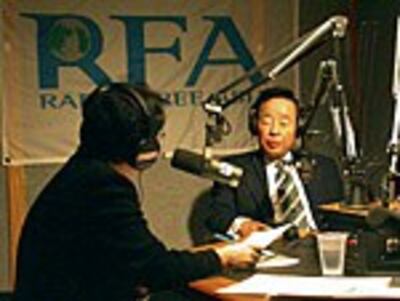
WASHINGTON—Former South Korean President Kim Young Sam has hit out at widespread human rights abuses in the Stalinist North, calling the regime “a frozen land” destined to collapse.
"There is no freedom or democracy there. Until this system changes, there is no hope,” Kim told RFA’s Korean service in an interview at RFA studios in Washington D.C. He is on a week-long U.S. visit, during which he will attend the inauguration of the Clinton Library Nov. 18 in Arkansas.
Kim, a former dissident under South Korea’s military regime, was elected president in 1993. His term ended in 1998 amid a series of corruption scandals in his administration.
“All of North Korea is a jail,” he said. “There is no freedom of movement… They have no freedom to go anywhere. As president, I came to know that North Koreans need permission from party officials—a permit—even to attend a relative’s funeral services a short distance away.”
North Korea ‘will collapse’
“As long as Kim Jong Il is there, I don’t think the human rights situation will improve,” Kim said in an interview with RFA’s Korean service.
“To Koreans on the other side, we care about your freedom. We can’t say when exactly, but I am quite confident that North Korea will collapse,” Kim said.
I am quite confident that North Korea will collapse.
Few South Korean political figures have directly attacked widespread rights abuses in the North, which runs a Stalinist-style regime of death camps and terror while those without Party or military connections can face starvation.
The media are a tightly controlled state-directed mouthpiece, where reporters can be sent to labor camp for misspelling the name of a senior official, Paris-based press freedom group Reporters Without Borders (RSF) said in a recent report.
Room for improvement
Defectors and human rights researchers have described in detail a gulag where “wrongdoing” on the part of an individual can mean their entire family ends up dying in the regime’s concentration camps.
South Korea has itself come under fire from overseas human rights groups over its suppression of labor unrest and some aspects of freedom of expression. Seoul has also shown unwillingness to anger its powerful neighbor China on sensitive issues such as Taiwan and Tibet.
Kim said he saw little hope of success for six-nation talks on North Korea’s nuclear program, which he said was motivated by aggression towards South Korea, Japan and the United States, in that order. “It’s very certain that North Korea is developing nuclear weapons for offensive purposes,” Kim told RFA’s Korean service. “They don’t need nuclear weapons to defend their own country.”
Aggressive nuclear policies
Kim said he wholly supported mass defections by North Koreans, some 300,000 of whom are thought to be living clandestinely in China. They frequently storm buildings attached to foreign countries, in a desperate bid to win passage to a third country.
“I think that’s a very good thing,” Kim said. “I feel very sorry for the one or two North Korean defectors who were caught by Chinese police while entering South Korean or foreign embassies in Beijing, but their arrest drew the whole attention of the world.”
But he criticized the current Seoul government for its soft attitude to Pyongyang. Kim told RFA: “I don’t think the current regime of South Korea will deal actively with the issue of North Korean defectors. In my mind, the current regime fundamentally does not want North Korea to collapse, or Kim Jong-il to go to ruin that much. It is the Seoul government’s stance that Kim Jong-il should not be badmouthed or criticized.”
